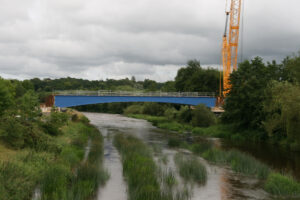 Aquatic & non-aquatic environmental impact assessment
Aquatic & non-aquatic environmental impact assessment
Industrial or residential developments inevitably have an impact on the aquatic and terrestrial environments. AQUENS will assist in baseline surveys and predicting the effects of proposed emissions and discharges to the aquatic environment and with EIS statements thus ensuring compliance with EU and other legal requirements.
Any development which involves alteration of the physical landscape requires permission from An Bord Pleanála and an assessment of the impact on the total environment of such development. While most construction noticeably impinges on the physical terrestrial landscape, frequently there are also impacts on adjacent aquatic habitats. A thorough knowledge of the flora and fauna, and the likely impact of the development thereon, is an essential pre-requisite for the planning application.
Rivers, small tributaries, streams and lakes often occur within the confines of the proposed development area. When this happens the ecologists will advise on how best to use ‘set aside’ in relation to the aquatic zone. The term ‘set aside’ is used to denote strips of the river banks which are allowed to grow wild and act as safety corridors for game birds such as the pheasant and wild duck. The bank vegetation is allowed to grow unimpeded and promotes nesting facilities, the survival of young game birds and small mammals. Other amenities such as fishing stands, stiles and pathways can be added at strategic points along the bank to facilitate anglers. Special drinking areas can also be introduced to allow easy passage down to the water’s edge for cattle and sheep. Such developments also help protect the banks from damage.
Compilation of habitat and floral and faunal inventories necessitates field surveys and scientific assessment and of the plants and animals occurring on the site, whether on land or water. Aquens will investigate the plant and animal communities, of aquatic habitats, riparian bankside habitats and carry out assessment of grassland and hedgerow invertebrates, birds and mammals. Special attention is paid to rare and protected plants and animals. Technical reports and non-technical summaries of the scientific findings prepared by AQUENS may be presented at the sworn inquiry at which An Bord Pleanála presides. AQUENS has been involved in many such projects and has both the expertise and capability of providing required assessments.